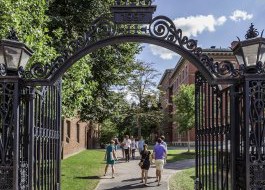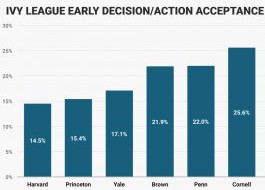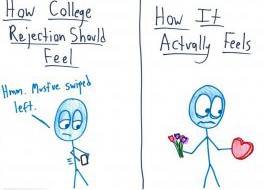 While this Harvard interviewer would mix up her questions, there were a few she frequently liked to ask.Rose Lincoln/Harvard Staff PhotographerOf the more than 39,000 people who applied to be part of Harvard College's class of 2020, a little more than 2,100 were admitted. That's about a 5% acceptance rate.
While this Harvard interviewer would mix up her questions, there were a few she frequently liked to ask.Rose Lincoln/Harvard Staff PhotographerOf the more than 39,000 people who applied to be part of Harvard College's class of 2020, a little more than 2,100 were admitted. That's about a 5% acceptance rate.
To help whittle these numbers down, the Ivy League college employs the help of more than 15,000 volunteer alumni and alumnae from all 50 states and certain countries around the world to conduct interviews.
Most applicants to Harvard College are given the opportunity to meet with an interviewer in their area, though interviews can't always be arranged due to the limited number of interviewers in their region.
One such interviewer, Jillian Bayor, interviewed applicants in the Southern California region on a weekly basis — and often more than one applicant a week — during the admissions seasons of 1998, 1999, and 2000, before opening her own college admissions firm, Ivy League Essay, where she works with students applying to some of the most competitive schools out there, and business school admissions firm, MBA Ivy League.
About two weeks in advance, Bayor says Harvard would send her a file about the student she'd be interviewing with their application materials. She'd reach out to them to schedule an in-person interview, which she often conducted at their school after hours. Interviews would typically last between 45 minutes and an hour, with 30 minutes being on the shorter end of the spectrum.
Bayor — who graduated from Harvard with a master's in 1995 — says before becoming an interviewer, the college provided her with an extensive, almost 80-page printed packet detailing the guidelines of interviewing.
"They have a very regimented way of doing this and they're training you to do it so you're going to be able to write that report, that statement, and have it highlight things that the admissions — the ones who actually sit around the table and make the final decision — are looking for. You want that report to best represent the student," she says.
Bayor says it was vital for Harvard interviewers to understand the significance of what they were doing.
"You really have to be selective and choose students who are going to be able to handle the academic rigors and the emotional aspects of going to a school like that and be able to think on a new level. That's what you look for."
Overall, Bayor says she wanted to find students who could have a conversation with her, rather than ones who simply waited for her to ask questions and gave her robotic, canned answers.
While Bayor says she would mix up her questions depending on the student and conversation, there were a few she almost always asked:
'What are you interested in potentially studying in college?'
Prior to meeting her students, Bayor says she's already read their applications and knows everything about them that the admissions office in Cambridge, Massachusetts, knows. But while she probably already knows the answer to some of them, she says she liked to start the interview with very general questions.
"The students come in and, no matter how intelligent they are, no matter what they've achieved — it's very intimidating to come into a Harvard interview — most of them are just nervous beyond belief," she explains. "So, initially I ask very general questions to kind of just get them to relax a little bit to show them that I'm not scary and just try to get their real personality out as much as possible."
Apart from being a good ice-breaker, Bayor says asking about what they want to study at Harvard also helps her discern how focused and driven a student is.
"It seems to me that the students who are more competitive are the ones who actually have an idea what they want to go in and study — even if that ends up changing," she says.
"Most answers are going to be kind of vague, wishy-washy — you're going to hear the confusion and angst — whereas a student who is more confident has a target that they're shooting for," Bayor says.
She'd then follow up the question by digging deeper into why the students are interested in that area of study so she can get a better sense of how intellectually curious they are.
"For the level of a school like Harvard, you need someone who has intellectual curiosity," Bayor explains. "You're basically trying to weed out with that very first question students who are very lost or vague or who you get the sense — and this has happened to me many times and I always feel a lot of compassion for the students — don't really belong there and they've been pushed to apply or pushed to go to the interview by their parents, who are waiting with their ears pressed to the door out in the hallway."
After about a half hour of these kinds of questions, Bayor says she'd have a sense of whether or not the student was competitive enough and had a chance. If not, she wouldn't give them any difficult questions and would end the interview.
But if she considered the student to be competetive and interesting, she said she'd then like to throw them a curveball.
'What's the most negative experience you ever had in school?'
"They're not prepared for that question. No one likes to think about the bad things," Bayor says.
By asking them about a negative experience, she explains that she would actually get an authentic, honest answer.
Bayor says there is no right answer to this question — the negative experience could be from an academic perspective, a social one, or even a medical one. "It can really be anything at all — what I'm interested in is an authentic expression of what the situation was."
The she said she'd look for how the student handled the situation and bounced back.
"It's that bounce-back part that could add something positive to my assessment. You're looking to see if students are able to go through stuff and actually — I don't know if the word is not take it personally, because it is personal, in that it happened to them — be able to say, 'you know, a bad thing happened, it was very, very difficult, but I was able to move forward from it, move on from it, do A, B, C, and D in a positive way. Basically, you want to end on a positive note."
Even if that positive note is simply taking away from the situation that they should focus on what's ahead, Bayor says, "that in itself shows a positive, optimistic attitude that I think is important when you go to such a competitive school. You need to be able to handle rejection, you need to be able to handle failure, you need to handle these things and immediately get back in the game. That healthy bounce back trait is something that I think is important."
'What do you do when you're not in school?'
Bayor says this question reveals a lot about a student, and it helps her separate students into one of two categories: "pin-point focused" and "well-rounded"
"One is not better than the other, these are just two different types of students in terms of extracurriculars.," she explains."
The "pin-point focused" students focus exclusively on one extracurricular activity, which they tend to have been doing for much of their lives, and these students are often ranked in some way. The "well-rounded" students, on the other hand, focus on a few activities, like playing an instrument, playing on a sports team, or participating in cultural events or lessons after school.
"Whether they're pinpointed or well-rounded, I'm looking for uniqueness," Bayor says.
"What makes this student different than the student on either side of them? What makes them different from their friends at school? What makes them unique? That's where having a unique extra curricular activity can really make you stand out on your college application," she says.
'What have you read recently?'
With this question, Bayor says she would try to determine how intellectually curious and engaged in the world the students were.
"You want someone basically who is already at an adult level in terms of their ability to have a conversation, their ability to have many, many topics that are high level," she says.
"I'm looking for intellectual vastness in the wide word — a level of intellect that I really would not be able to tell the difference if I didn't know their age and wasn't sitting in front of them that they weren't already actively doing things in the world at a very high level," Bayor says.
She says only being able to talk about graphic novels or humorous blogs would be a red flag. "You'd better mention something serious to me, too," she says.
"I recognize these are teenagers, and you want well-adjusted teenagers who are normal, who are able to have friends and interact with their peers," Bayor explains. "But you also want to see that they have a serious mindset, too, where they're able to read the New York Times, they have a valid news source that isn't just their newsfeed on Facebook."
'What's the last cultural event you went to' or 'What have you done or seen lately?'
Bayor says she would also look for exposure and awareness.
"There's such a diversity across the country, it could be something like, 'Oh, I'm in Kentucky and I went to this folk art festival.' That could compare equally with saying you went to the Metropolitan Opera."
Bayor says there's no class or income distinction in that regard.
"I just want to know that you're doing something that's interesting, even if it's particular to your region of the country," she says. "You want students who are doing more than just sitting around playing with Instagram."










